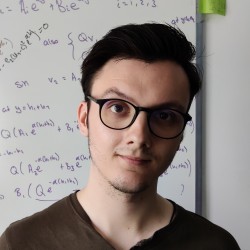
Ryan Poole
"One of my best moments so far was submitting my paper for review for the first time. Even though it was just the submission, it felt like a true academic milestone had been achieved."
Course
Mathematics PhDEntry year
2020Research project
I look at how flexible boundaries can make fluid flows unstable. I look at a range of instability types, comparing the performance of compliant walls to rigid walls/no walls. This project is quite computationally intensive compared to other projects but does have a strong mathematical framework around it.
Why did you choose to come to Surrey for your PhD?
I grew up close to Guildford so being able to study here worked well for me. The campus is a good size, not too big or too small, with quiet places to study.
I did my integrated masters course (MMath) at Surrey before my PhD. By the time I finished my masters year, I felt that a career in research was something I wanted to explore, so it was a natural choice to go on to do a PhD. Since I’d been at Surrey for four years by that point, I was familiar with the campus and the staff, so I was quite happy to stay here for a bit longer!
Why are you passionate about your subject?
In the second year of my MMath, I took a module on inviscid fluid dynamics, which ignited my passion for fluid dynamics. I enjoy the mix of mathematical foundations, physics and computer programming that the subject calls for (the three things I enjoy doing the most). From this, you can apply the same mathematics from flow in rivers to the atmospheres of exoplanets, so there is quite a lot of flexibility. I also really like the way you can visualise what's going on as a flow changes in time; it just makes understanding the physics that much easier for me.
What have you enjoyed most about your PhD? Have you made any exciting research discoveries?
I’ve really enjoyed putting the skills I learnt in the MMath to use in tackling problems in my PhD. In particular, I’ve really enjoyed improving my coding skills. I’m familiar with a few different languages now (at the end of my third year) and can easily code up algorithms that I found difficult to understand at the start of my programme. Being able to see that you’re getting better at what you do is an amazing feeling.
One of my best moments so far was submitting my paper for review for the first time. Even though it was just the submission, it felt like a true academic milestone had been achieved.
How has your supervisor helped you to achieve your aims during your PhD studies?
My supervisor, Dr Matt Turner, has been very supportive over the course of my PhD. He’s helped me stay on track when I’ve found myself down a rabbit hole and provides me with constructive feedback on how I’m doing, whether that’s related to my academic writing or the efficiency of my computer code.
He is also a great sounding board for my thoughts and ideas, especially when I haven’t formulated a reasonable train of thought. Having him there really helps me put the pieces together in a way I wouldn’t have done if I were on my own.
Other Maths staff have also been very helpful, especially when it comes to understanding a method that is not in my field. If there is a problem, I know someone will have an answer.
"Don’t worry about not knowing the answers to everything. Research is about not knowing something, and then trying to find out."
What are the best things about life in general at Surrey? Are you part of any clubs or societies?
I am part of the Maths Society and the Postgraduate Society. It’s a great way to meet like-minded people and socialise.
The campus is surrounded by some wonderful walking trails, which my friends and I often explore when the weather is nice. Having Surrey Sports Park nearby is great as I can go rock climbing/bouldering, which is always fun.
The Maths PGRs also arrange quizzes and socials throughout the year, and they are some of the best fun I’ve had here. I've met some of my closest friends at Surrey and I’m very thankful for that.
Do you have any advice for students thinking about postgraduate study?
Make sure you find a supervisor you get on with, as the student–supervisor relationship is particularly important when working together on a big project like a PhD. And don’t worry about not knowing the answers to everything. Research is about not knowing something, and then trying to find out. Once you get over that hurdle, it's much easier to make progress.
What are your plans for the future?
I would like to become a research fellow at some point. I really enjoy the research side of academia, so being able to continue that in some way really appeals to me.
Find out more about our Mathematics PhD and being a postgraduate researcher at Surrey.

